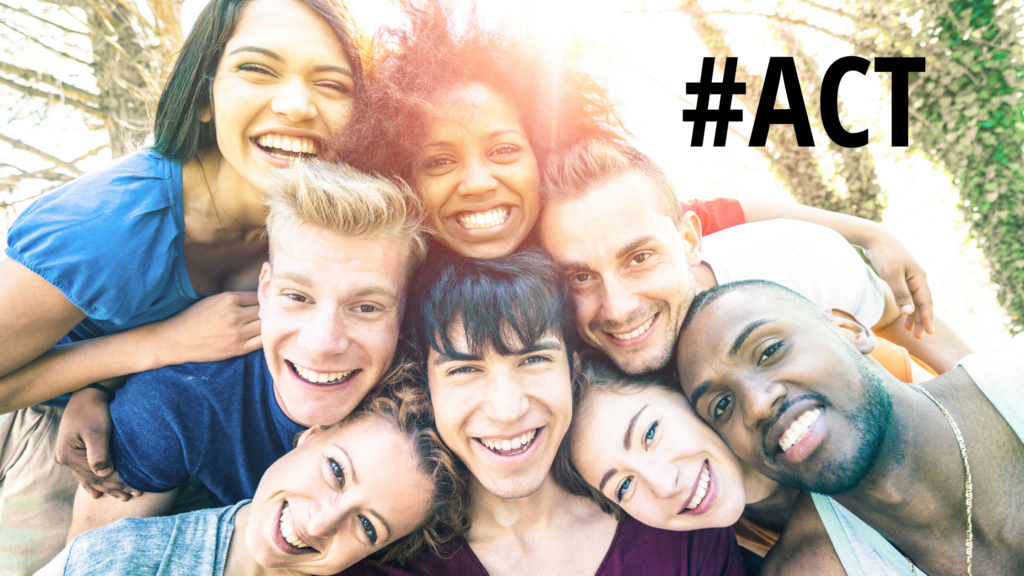
I previously discussed the impact racism has had on me as a black parent in Part 1 – Racism: So, What Now. In this post, I will introduce the acronym, ACT, to demonstrate how we can all contribute to ending racism and, together, be the change we want to see in the world.

Acknowledge that the issues affecting millions of black people everyday are real.
Black people worldwide have been misunderstood, undervalued, and made to feel like their lives don’t matter because they often lack the power, resources, and influence necessary to be heard. The silent suffering that they endure is often not acknowledged outside of the black community thus giving the perception that these problems don’t exist.
From police brutality and murder to the traumatic experiences of millions of youth facing discrimination in our schools, it’s all a part of the ongoing problem, and it’s real. It’s time to acknowledge the dehumanization and pain experienced by many marginalized groups, empathize with their struggles and be a part of the movement to make change happen.
Accept that the world is finally ready to listen, learn and act.
As traumatic and sad as the deaths of Ahmaud Arbery, George Floyd, and Regis Korchinski-Paquet are, these events sparked the current protests and movement against anti-black racism.
The world is finally ready to listen, learn, and act together, and it brings me joy to know that maybe this could be the beginning of a revolution.
I have never felt that the support across different communities aligning together like in the way I’ve seen in the past few weeks. I never believed that we would see justice served in these senseless killings, which led me to accept that this is the way things were.
It never entered my mind that people from other groups could truly understand the “black” experience, but today I am willing to accept that people get it. What we are witnessing today is unprecedented, and it certainly provides a lot of hope for all marginalized communities.

Check yourself and Correct behaviours that are negatively affecting marginalized communities.
I believe that for any change to occur, there has to be a point when we all have to start being more introspective and evaluate how our behaviours might negatively affect not only other people within our communities but outside of our communities as well.
Correcting these old behaviours will not be easy as it comes with the price of possibly opening old wounds and forcing you to challenge everything you once knew to be true about people you identify with and those you don’t.
Correction doesn’t mean to erase and forget about the past. It’s more of a call to action to be supportive of those suffering while committing to create a future of equality, compassion and kindness for all humanity.
Choose to heal
While checking our behaviours is crucial, it’s equally important to check in on ourselves and others.
How have you been dealing with this crisis all along?
How are you dealing with it now?
What impact has it had on your life and those around you?
What does healing mean, and how will it look for you?
Whether you are a part of a marginalized community or you are an ally, let’s all be real about what we are feeling at the core right now so we can allow the healing to start and stand together against racism.

Teach someone else, especially your children
Racism is one of the most challenging topics to discuss. We fear being judged negatively by the person we are speaking to, and tensions can run high. You don’t have to be the next controversial public activist to cultivate change; you could stand in your truth, be yourself and be open to another perspective.
The trending phrase “silence is compliance” does not require you to do what’s uncomfortable for you to save face. It means that you should take a genuine stand for what’s right and share your knowledge; this is how we learn. Let’s be real; we know a lot of what we know today because someone was brave enough to share their experience, whether good or bad.
Take the time to share knowledge with your circle of influence. Discussing issues surrounding race with a close friend or even your family can have a significant impact. These conversations should include your children.
Spoken words evaporate if there is no one to hear them or no one to repeat them.
Alyssa Gray-Tyghter
Our children need tools to navigate the world, especially when dealing with racism because there are so many things about it that don’t make sense. Finding a community for support, being open-minded and getting very clear about how you feel will be vital to getting through these tough conversations. It’s important to remember that we are our child’s first teacher. It’s up to us to be their guide and clarify any confusion or fear that they might be dealing with silently.
If we, as parents, can be brave and face our discomforts, I hope that we can raise children who are courageous and willing to change the world, one person, at a time.
Trust the process
As we’ve seen in the earlier points, ending racism is no walk in the park as there is a lot of work to be done, but trust the process; no challenge, no change.
Exercise self-compassion and self-kindness along your journey and remember that we all have this burden, but the real change starts within you. When we start being more kind and compassionate with ourselves, we can extend kindness and compassion to each other.
Wrapping It Up
These are just a few steps you can take right now to exercise your power and stand against racism. Racism is real. It’s time to join forces and stop thinking that the problem only belongs to the oppressed; it belongs to us all.
Deliberately working to liberate ourselves from our old ways of thinking and acting that were negatively affecting ourselves, our communities, and other communities is a form of self-care.
This fight is a spiritual, mental and physical revolution within us all that will make the world a better place. As the late Martin Luther King Jr. once said, “injustice anywhere is a threat to justice everywhere.” We all must do our part to make change happen and I know we can do it!
Do you have any other ideas to help contribute to the fight against racism? Share them in the comments below.

